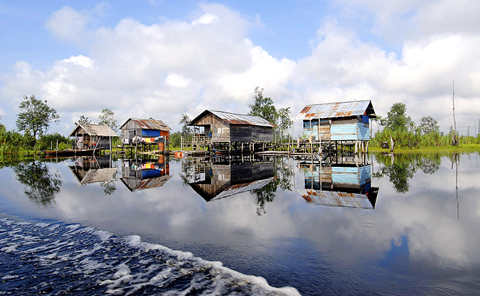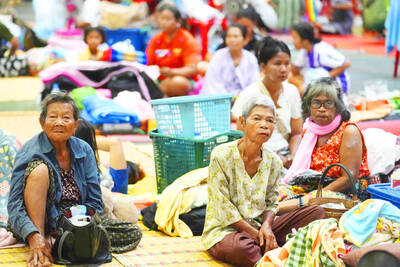Within a vast deforested area on Borneo island, Australia and Indonesia hope to turn an ecological disaster into a global lesson on how to help local communities save tropical forests and fight climate change.
Borneo, like the Amazon, is at the center of efforts to fight deforestation that is a major contributor to global warming and many governments are trying to build on a UN-backed scheme that aims to reward developing nations for preserving their forests.
Billion of dollars in annual revenues are potentially in the offing but getting the support of local communities is crucial if forests are to remain standing and the scheme is to succeed.

PHOTO: REUTERS
“The major challenge is to change the behavior of the community. That’s the main problem,” said Ben Tular of CARE Indonesia.
The NGO is among a number of groups helping Australia and Indonesia develop the Kalimantan Forests and Climate Partnership (KFCP) which aims to preserve and rehabilitate 100,000 hectares of carbon-rich peat land in Central Kalimantan.
Half the area has been cleared and half is still forested but under threat unless alternative livelihoods are found for the 20,000 people living in and around the project area. Australia has pledged A$30 million (US$24million) to fund the project until 2012 and a full field team will be on the ground from next month.
Tular, CARE’s program manager for the project, said there had been an sharp increase in deforestation in the KFCP area because revenues from rubber, the main source of income for many villagers, had plunged because of the global financial crisis.
“Most of them have tried to developing farming there,” he said of the cleared area of 50,000 hectares.
“But maybe about 90 percent of activities have failed because the land is very acid. Most of the crops are dead.”
KFCP, though, is part of a much wider problem. It represents a fraction of an area of forest cleared in the 1990s on the orders of former Indonesian president Suharto on the mistaken hopes of growing vast crops of rice.
About a million hectares of forest were cleared, much of it sitting on carbon-rich peat swamps, and more than 4,000km of drainage canals were dug.
Observers who’ve seen the failed site from the air, say the former mega rice project area looks like a giant scar on the land, and during the dry season it is vulnerable to burning.
But where many see disaster, others see opportunity in the vast amount of carbon locked away in the peat soils.
The sale of carbon credits from stopping the peat land from burning and replanting the denuded areas could provide the incentive to slow the rate of deforestation, particularly in Borneo, which has already lost about half its forests.
Tropical rainforests and particularly peatland forests, soak up vast amounts of carbon-dioxide, locking away carbon in the wood and soil. Peat forests can release more than 2,000 tonnes of carbon dioxide per hectare when drained and burned as well as large amounts of methane, a far more powerful greenhouse gas than carbon dioxide .
AusAID, the Australian government’s aid arm, and the Department of Climate Change in Canberra are helping develop the KFCP program along with the Indonesian government and the Central Kalimantan provincial administration.
The program is one of the first large-scale demonstration projects under the UN-backed forest carbon scheme. Called reduced emissions from deforestation and degradation (REDD), the project aims to use carbon credits from saving forests to reward developing nations.
In the meantime, the Kalimantan partnership aims to tackle the very causes of deforestation.
“There’s no point going in to do rehabilitation work if you’re not looking at the broad drivers of deforestation,” said Clare Walsh of the Department of Climate Change in Canberra.
These drivers included subsistence farming, logging or other uses of the forests and it was crucial to focus on economic development opportunities to tackle them.
Alternative schemes could include fish farming, growing alternative cash crops and sustainable forestry by planting valuable timber species for harvesting. CARE has already introduced some of these into communities elsewhere in the mega-rice area.

FOREST SITE: A rescue helicopter spotted the burning fuselage of the plane in a forested area, with rescue personnel saying they saw no evidence of survivors A passenger plane carrying nearly 50 people crashed yesterday in a remote spot in Russia’s far eastern region of Amur, with no immediate signs of survivors, authorities said. The aircraft, a twin-propeller Antonov-24 operated by Angara Airlines, was headed to the town of Tynda from the city of Blagoveshchensk when it disappeared from radar at about 1pm. A rescue helicopter later spotted the burning fuselage of the plane on a forested mountain slope about 16km from Tynda. Videos published by Russian investigators showed what appeared to be columns of smoke billowing from the wreckage of the plane in a dense, forested area. Rescuers in

‘ARBITRARY’ CASE: Former DR Congo president Joseph Kabila has maintained his innocence and called the country’s courts an instrument of oppression Former Democratic Republic of the Congo (DR Congo) president Joseph Kabila went on trial in absentia on Friday on charges including treason over alleged support for Rwanda-backed militants, an AFP reporter at the court said. Kabila, who has lived outside the DR Congo for two years, stands accused at a military court of plotting to overthrow the government of Congolese President Felix Tshisekedi — a charge that could yield a death sentence. He also faces charges including homicide, torture and rape linked to the anti-government force M23, the charge sheet said. Other charges include “taking part in an insurrection movement,” “crime against the

POINTING FINGERS: The two countries have accused each other of firing first, with Bangkok accusing Phnom Penh of targeting civilian infrastructure, including a hospital Thai acting Prime Minister Phumtham Wechayachai yesterday warned that cross-border clashes with Cambodia that have uprooted more than 130,000 people “could develop into war,” as the countries traded deadly strikes for a second day. A long-running border dispute erupted into intense fighting with jets, artillery, tanks and ground troops on Thursday, and the UN Security Council was set to hold an emergency meeting on the crisis yesterday. A steady thump of artillery strikes could be heard from the Cambodian side of the border, where the province of Oddar Meanchey reported that one civilian — a 70-year-old man — had been killed and

POLITICAL PATRIARCHS: Recent clashes between Thailand and Cambodia are driven by an escalating feud between rival political families, analysts say The dispute over Thailand and Cambodia’s contested border, which dates back more than a century to disagreements over colonial-era maps, has broken into conflict before. However, the most recent clashes, which erupted on Thursday, have been fueled by another factor: a bitter feud between two powerful political patriarchs. Cambodian Senate President and former prime minister Hun Sen, 72, and former Thai prime minister Thaksin Shinawatra, 76, were once such close friends that they reportedly called one another brothers. Hun Sen has, over the years, supported Thaksin’s family during their long-running power struggle with Thailand’s military. Thaksin and his sister Yingluck stayed